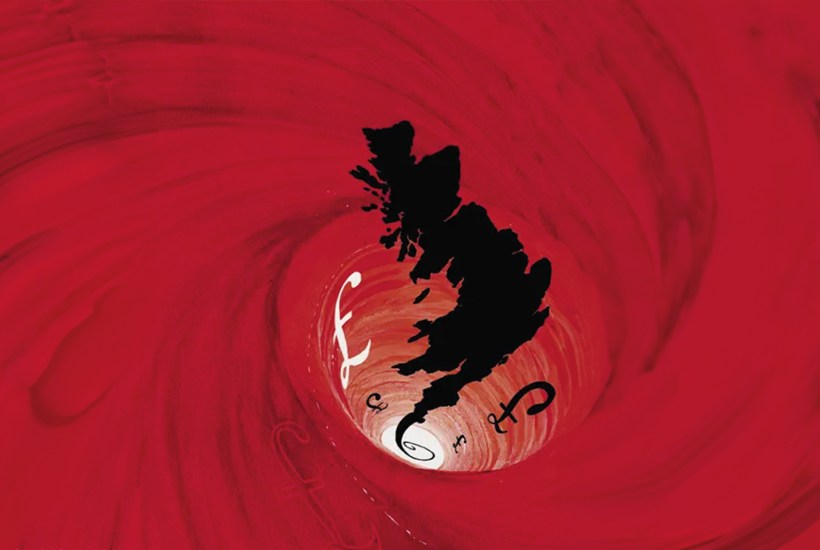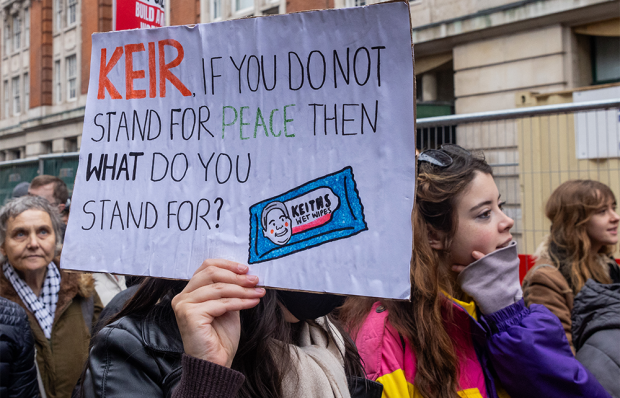An Institute for Fiscal Studies paper, published at the end of last month, makes grim reading. Through the prism of the media reports it generated (‘One in 11 workers in England could be NHS staff by 2036,’ said the Guardian; ‘NHS staff will make up 49 per cent of the public sector workforce in 2036,’ said the Times), the most sensational finding was that our health service will be eating up an ever-increasing share of public spending. But, as so often, this particular cuckoo in the nest of public provision is only the most newsworthy of so many indications of Britain’s long, slow slide into insolvency.
The paper is part of the Institute’s series Green Budget 2023. A week earlier its report ‘Tax and public finances: the fundamentals’ began with a sentence that says it all: ‘The big-picture choices over how much to tax and spend will be difficult in large part because of poor economic growth and growing spending pressures.’ Were we to look at this nation as a bank manager might look at his client, that might be rendered ‘spending beyond his means, with no indication that his means will catch up with his spending’.
And so we descend – or our politics descends – into bickering, special pleading and shroud-waving demands for more. As I write, the newspapers are full of stories about the Treasury’s failure to spend enough, early enough, on dangerous concrete in school buildings, and the story is moving on now to the need for asbestos removal. The NHS has never looked less fit for purpose – and it’s all, they say, about money.
Money, money, money. Ben Wallace, the former defence secretary, vents his dissatisfaction at waste in the Ministry of Defence and repeats demands for a budget that reflects the European war in which we’re half-engaged. Farmers Weekly worries that ministers won’t keep their word on the big new calls on the public purse that arise as we move away from the EU’s Common Agricultural Policy. Outer Londoners don’t want to pay the hefty new charges the Mayor’s Ultra Low Emission Zone imposes. The Shetland Islands – bless them – want to be linked by eye-wateringly expensive tunnels such as the Faroes have; and are not going to get them.
We witter on endlessly about ‘mental health’ and how we should be spending more on that least successful branch of medicine in terms of demonstrable outcomes. When the NHS struggles to afford costly new drugs or procedures our journalism snuggles back into the comfortable old lie that ‘one life lost is a life too many’. Nobody arguing for the amputation or cancellation of HS2 ever proposes that the imagined savings should just be pocketed by the Exchequer: they always argue it would be better spent on some different rail project. Motorists, meanwhile, rage against governments that have in fact lacked the guts to raise fuel duties in line with inflation. And, ever and anon, other less visible taxes keep rising – at 37 per cent of national income (says the IFS) the highest since the 1940s.
I have never known a time when our country has more depressingly resembled a mental health patient presenting with symptoms of what, given the current fashion for syndromes, we should perhaps call ADAS – Advanced Displacement Activity Syndrome. New laws to stop whatever abuse has most recently hit the headlines, new laws to be named after whichever child is the latest victim of private vice or public sector incompetence, new laws to bind ministers to their own promises, new laws to prevent ministers from repealing the new laws already enacted – promising, as it were, not to break their promises… I await the first new law promising that ministers won’t break their promise not to break their promises. And so it goes on as we slither into a nasty stew of suspicion, censoriousness and sentimentality.
I see no break in the clouds. Our economy is hardly growing, we can’t afford all this, and as a nation we actively dislike our most successful money-makers, the City. Indeed we appear to dislike our own metropolis, London. And our older generation, many choosing to retire early, leach off the younger generation, raising our own triple-locked pensions every year. As the gap grows between what we think ourselves entitled to and what our governments can afford, public debt or public dissatisfaction – most likely both – can only grow.
Could I ask readers, as I’ve done before, to think about Argentina, once one of the world’s richest countries, but whose sources of great wealth have long dried up and whose population has stubbornly refused to accept the consequences of their reduced circumstances? Every government, elected or military, falls as it becomes clear it cannot keep the promises that propelled it into power. In Buenos Aires – a city renowned for the numbers of its toy dogs and psychoanalysts – the middle classes bang saucepans under ministers’ windows to protest, while the poor succumb to waves of enthusiasm for each new and finally doomed saviour.
I was there recently. Inflation is heading for 140 per cent and there’s a general election next month. It looks as though the latest darling of the desperate, Javier Milei, a wild-man economist they call El Loco, may win. He’s promising to peg the peso to the US dollar. This should stabilise the economy; but it will also take an axe to state spending. Senor Milei will then fall, like the others.
Only war, or complete economic collapse, induces in a people the willingness to think again about what they’re entitled to. I begin to think that the worst possible outcome for Britain is for a cautious, sensible Conservative government or a capable, prudent Labour one, to take the reins and do their intelligent and realistic best to keep the show on the road. Either could stave off the inevitable for a while. And that’s the choice we’re likely to have at a general election next year. Après nous le déluge.
Got something to add? Join the discussion and comment below.
Get 10 issues for just $10
Subscribe to The Spectator Australia today for the next 10 magazine issues, plus full online access, for just $10.
You might disagree with half of it, but you’ll enjoy reading all of it. Try your first month for free, then just $2 a week for the remainder of your first year.















Comments
Don't miss out
Join the conversation with other Spectator Australia readers. Subscribe to leave a comment.
SUBSCRIBEAlready a subscriber? Log in